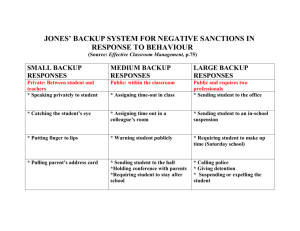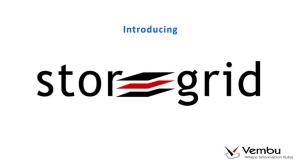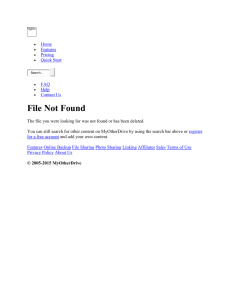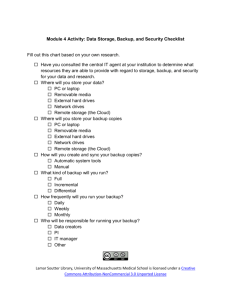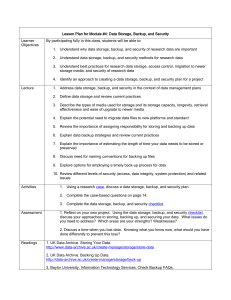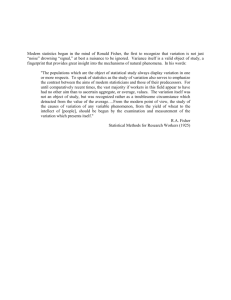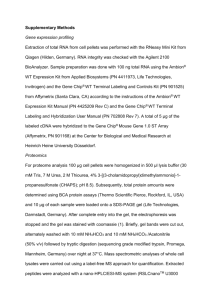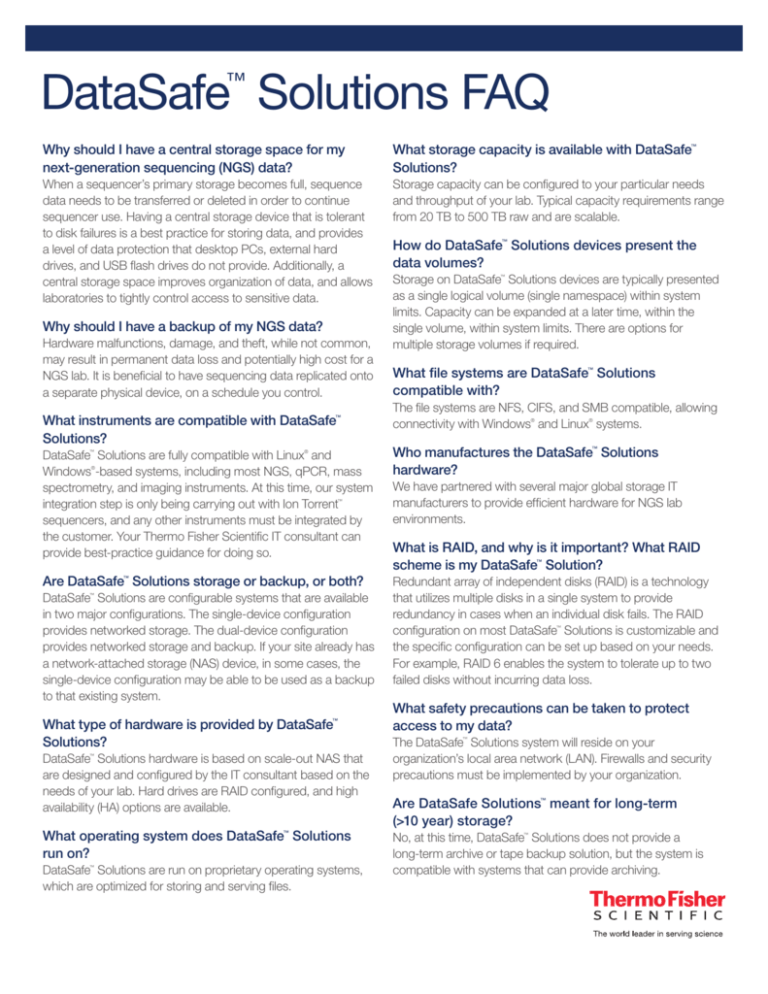
DataSafe Solutions FAQ
™
Why should I have a central storage space for my
next-generation sequencing (NGS) data?
What storage capacity is available with DataSafe
Solutions?
When a sequencer’s primary storage becomes full, sequence
data needs to be transferred or deleted in order to continue
sequencer use. Having a central storage device that is tolerant
to disk failures is a best practice for storing data, and provides
a level of data protection that desktop PCs, external hard
drives, and USB flash drives do not provide. Additionally, a
central storage space improves organization of data, and allows
laboratories to tightly control access to sensitive data.
Storage capacity can be configured to your particular needs
and throughput of your lab. Typical capacity requirements range
from 20 TB to 500 TB raw and are scalable.
Why should I have a backup of my NGS data?
Hardware malfunctions, damage, and theft, while not common,
may result in permanent data loss and potentially high cost for a
NGS lab. It is beneficial to have sequencing data replicated onto
a separate physical device, on a schedule you control.
What instruments are compatible with DataSafe
Solutions?
™
™
How do DataSafe Solutions devices present the
data volumes?
™
Storage on DataSafe Solutions devices are typically presented
as a single logical volume (single namespace) within system
limits. Capacity can be expanded at a later time, within the
single volume, within system limits. There are options for
multiple storage volumes if required.
™
What file systems are DataSafe Solutions
compatible with?
™
The file systems are NFS, CIFS, and SMB compatible, allowing
connectivity with Windows and Linux systems.
®
®
DataSafe Solutions are fully compatible with Linux and
Windows -based systems, including most NGS, qPCR, mass
spectrometry, and imaging instruments. At this time, our system
integration step is only being carrying out with Ion Torrent
sequencers, and any other instruments must be integrated by
the customer. Your Thermo Fisher Scientific IT consultant can
provide best-practice guidance for doing so.
Who manufactures the DataSafe Solutions
hardware?
Are DataSafe Solutions storage or backup, or both?
Redundant array of independent disks (RAID) is a technology
that utilizes multiple disks in a single system to provide
redundancy in cases when an individual disk fails. The RAID
configuration on most DataSafe Solutions is customizable and
the specific configuration can be set up based on your needs.
For example, RAID 6 enables the system to tolerate up to two
failed disks without incurring data loss.
™
®
®
™
™
DataSafe Solutions are configurable systems that are available
in two major configurations. The single-device configuration
provides networked storage. The dual-device configuration
provides networked storage and backup. If your site already has
a network-attached storage (NAS) device, in some cases, the
single-device configuration may be able to be used as a backup
to that existing system.
™
What type of hardware is provided by DataSafe
Solutions?
™
DataSafe Solutions hardware is based on scale-out NAS that
are designed and configured by the IT consultant based on the
needs of your lab. Hard drives are RAID configured, and high
availability (HA) options are available.
™
What operating system does DataSafe Solutions
run on?
™
DataSafe Solutions are run on proprietary operating systems,
which are optimized for storing and serving files.
™
™
We have partnered with several major global storage IT
manufacturers to provide efficient hardware for NGS lab
environments.
What is RAID, and why is it important? What RAID
scheme is my DataSafe Solution?
™
™
What safety precautions can be taken to protect
access to my data?
The DataSafe Solutions system will reside on your
organization’s local area network (LAN). Firewalls and security
precautions must be implemented by your organization.
™
Are DataSafe Solutions meant for long-term
(>10 year) storage?
™
No, at this time, DataSafe Solutions does not provide a
long-term archive or tape backup solution, but the system is
compatible with systems that can provide archiving.
™
Is this solution HIPAA compatible?
What are the transfer speeds to DataSafe Solutions
devices?
™
Yes, your DataSafe Solution's hardware is networked on your
intranet for authorized users only with user-specific or
IP-specific permissions.
™
Can the capacity of DataSafe Solutions be expanded
at a later time?
™
DataSafe Solutions are scalable and upgrades can be
performed by the DataSafe Solutions team or your internal
team.
™
™
Can I search and retrieve a specific run report?
Transfer speeds to the devices are dependent on the speed
of your intranet. If a dual-device configuration is chosen, the
transfer speeds between devices can be 1 GbE or 10 GbE,
based on your needs.
Do you provide a data recovery service, in cases of
data loss?
No, we can’t retrieve data from damaged hard drives and are
not responsible for data loss.
Yes, if your DataSafe Solution is integrated with Ion Torrent
Sequencers.
Do I need to host DataSafe Solutions in my local data
center or server room?
Can I search the DataSafe Solutions repository to
look for samples with a specific mutation?
No, the system does not provide tools for data mining.
A server room is recommended, but not required. Alternatively,
DataSafe Solutions can be deployed in mini-racks to fit in small
spaces. The space allocated for the hardware component
should have adequate HVAC and power source.
Is this an indexing system, and can I query
existing files?
Can DataSafe Solutions be used to expand an
existing NAS solution?
™
™
™
No, this is neither a laboratory information management system
(LIMS) nor a data management system.
What support is provided with DataSafe Solutions?
™
DataSafe Solutions come standard with 5-year, on-site support
for hardware and software. In addition, we include 1 year
of direct access to specialized IT consultants for integration
support, network connectivity support, and data management
support. The IT consultants are available remotely to walk
you through the necessary steps to recover data if needed.
IT consultant access can be extended beyond the first year
through a service contract.
™
I’m in a regulated lab (CLIA, GxP, ISO, etc.); do you
offer validation services?
In the future we plan to offer an optional computer system
validation.
Where are DataSafe Solutions physically located?
I’m not allowed to upload clinical data to cloudbased systems.
™
DataSafe Solutions are physical on-site storage at your
institution.
™
Do you offer an off-site backup option?
We offer some off-site solutions, including CloudSuite Digital
Storage. Please inquire for more details.
™
™
™
DataSafe Solutions are standalone NAS, available in singledevice configuration (networked storage) or dual-device
configurations (networked storage and backup). In some cases,
DataSafe Solutions may be integrated as a backup to an
existing NAS system.
™
™
Do I have the option to connect to the cloud for
additional backup?
Presently, there isn’t connectivity built into CloudSuite Data
Storage from Thermo Fisher Scientific, but a user’s IT
department can tie the DataSafe Storage to cloud-based
storage using their method of choice.
™
How much power do I need to run the system?
Power requirements are dependent on the solution configured
for you.
How long will system integration take?
The integration itself takes 2–4 days from the arrival of our IT
consultant to your site. The integration can begin after your
laboratory receives the hardware, the integration date has been
scheduled, and your site has been prepared for installation.
Who do I call for postintegration support?
Your Thermo Fisher Scientific IT consultant is available to help
with any questions or walk you through any data recovery
needs, and is available both by email and phone.
lifetechnologies.com/datasafe
© 2015 Thermo Fisher Scientific Inc. All rights reserved. All trademarks are the property of Thermo Fisher Scientific and its
subsidiaries unless otherwise specified. Linux is a trademark of Torvalds, Linus. CO29824 0215


